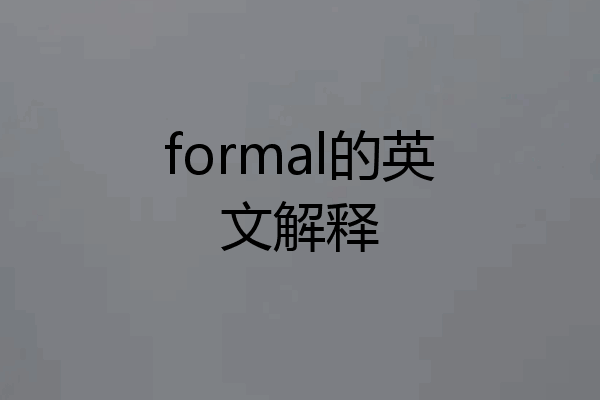
lifang88322
正式语言与非正式语言、口语与书面语的区别 1. 从词汇选择来看语体的区别 A. 名词 (a) 抽象名词作主语 抽象名词作主语多见于书面体、正式用语,如: The success of the book brought him tremendous popularity. (very formal) The book was highly successful and made him a very popular writer. (colloquial) (b) 以表示事物的名词作为通常属于人的行为、动作的主体时,常见于书面体;在口语体中,一般采用较朴实的说法(如:把书面体中的动词改为意义相近的其他动词,或改为以人为主语)。如: His knowledge is insufficient to enable him to complete this task. (formal) He is not competent enough to do this job. (colloquial) The manufacture of these goods is acquiring importance as an industry. (formal) The manufacture of these goods is becoming an important industry. (colloquial) (c) 有重复主语的句子 有重复主语的句子一般只用于日常用语,不用于正式场合,如: Jim and I took the long road. (for-mal)Jim and I, we took the long road. (informal) (d) 以there为开首的句子,主语与谓语在数上一致的是正式语言,不一致的是非正式语言。 There are a group of children ready to sing songs. (formal) There is a group of children ready to sing songs. (informal) (e) 所有格 The hood of the car is insulated. (formal) The car’s hood is insulated. (informal) (f) 缩略语与全称 正式语言常用全称,非正式语言常用缩略语。虽然在正式语言中用缩略语的情况越来越多,但在非正式语言中缩略语用得更多,如:TV, VOA, BBC, VIP, etc. 当然在一些个别场合,书面语中可用缩略语,而口语中不使用。 (g) 关于单复数 在泛指时,用复数偏通俗化,用the加单数比较文气,如:The cow is a useful animal. (a little literary) Cows are useful animals. (a little vulgar) B. 形容词 口语体中所用的形容词往往是人们最常用的形容词,这些形容词往往一词多义;而书面体中所用的形容词则往往不那么常用,这些形容词的含义往往不如口语体中所用的形容词的含义那么广泛,但其含义却往往具体、有特殊性。C. 副词 与形容词同形的英文副词往往用于口语,但诗歌中有时也用这种形式。然而,这些词却很少用于其他方面的正式用语。如: Work slowly and steadily. (formal) Work slow and steady. (informal) D. 介词 在一些状语或定语中,省略介词的属于口语,保留介词的属于书面语。如: It happened the day he did the experiment. (informal) It happened on the day on which he did the experiment. (formal) I’ll come in the following spring. (formal) I’ll come the following spring. (colloquial E. 代词 (a) 口语中多省略作主语的代词。如:Haven’t seen you for ages! (informal)(b) 关于mine, his, yours, ours当mine, his, yours, ours等物主代词作宾语或表语时,可用于书面语,也可用于口语。但如果这种物主代词(或名词所有格)作主语放在句首,并暗指表语名词所用的概念,那就是一种比较文雅的说法了。如: His (or Mr. Li’s) is a noble character. 在日常口语中一般这么用:His (or Mr. Li’s) character is a noble one. / He has a noble character.但下面这类句子对书面语和口语都适用:Your teacher and mine are talking in the room.(c) we, I在一些正式场合,作者或演讲人为了表示谦虚,往往避免用I,而用we代替。如:As we showed a moment ago ... (formal) As I said a moment ago ... (not so formal)(d) you, we用we代替you是一种表示客气的语言。如:Don’t worry about your shoes! (imperative) Why don’t we not worry about your shoes, OK ? (polite)(e) you, one在翻译中文"任何人"、"谁都"等时,译成one为formal language,译成you为informal language。如: One must love one’s country. (formal) You must love your country. (informal) (f) 关于I, me, he, him, etc. He says she saw you and me. (formal) He says she saw you and I. (informal) F. 动名词 在书面语中,一般用物主代词或名词所有格来修饰动名词短语,以表示行为者。如: Mr. Li dislikes Zhang Hui’s coming home late. There will be little chance of my visiting the place again. Li Wen’s falling ill suddenly gave me a surprise. 口语中一般以代词的宾格或名词普通格加分词、for加宾语加不定式、从句、独立句等方式表达。如:Mr. Li dislikes Zhang Hui coming home late. There will be little chance for me to visit the place again. Li Wen fell ill suddenly. This gave me a surprise. G. 关于缩写 用缩写形式多为非正式语言,而用非缩写形式多为正式语言,如:do not, we are, I am, I have, there is, cannot, will not等多见于正式语言,而don’t, we’re, I’m, I’ve, there’s, can’t, won’t多见于非正式语言。exam, bike等多用于口语,examination, bicycle等多用于书面语。oh, dear, why, well等是口语中常见的感叹词。 2. 从句法来看语体的区别 A. 修饰语 在书面文字中,修饰语可以与中心词相隔较远,修饰语也可以较长,而在口语中则相反。如: There exist complex computations in science and engineering which people are unable to make. (written) There are complex computations in science and engineering, and people are unable to make those computations. (colloquial) B. 句子的长短 一般来说,书面语句子较长,口语句子较短。 (a) 议论文、商业或法律公文等书面语不仅常用较长的修饰语,而且有时用较长的插入语,甚至插入语中还有插入语。但在一般的口语中则不用较长的插入语。常用的较短插入语有:of course, for example, I believe, I think, you see, you know, to be frank, etc. (b) 在书面语中,一个句子有时有好几个关系代词;而口语中关系代词则用的极少,往往被分成几个简单句。如:These needles, which were made of fish-shaped pieces of iron that floated on water, were acted on by the earth’s magnetic field. (formal) These needles were made of fish-shaped pieces of iron that floated on water. They were acted on by the earth’s magnetic field. (informal) C. 关于时态 在现在的口语中,有时用过去时代替现在完成时。如:—Is anybody using this chair? —No. I saved it for you. 在口语中常用现在时代替将来时。如: She is coming tomorrow. 在口语中有时用一般现在时说明一个已经发生了的动作。如: He says it is very important. D. 虚拟语气 (a)不够熟悉的人之间对话,或在正式场合演讲、对话时,一般用虚拟语气来陈述自己的看法、提出请求或邀请、提出建议或劝告、提出问题。如: If Mr. Wang was here now, he would tell you about it. (informal) If Mr. Wang were here now, he would tell you about it. (formal) (b) 有一些表示主观愿望和情绪的形容词,如desirous等要求后面的状语从句的谓语动词用虚拟语气,这种结构主要用于书面语中,口语中往往用不定式来代替这种从句。如: He was anxious that we should stay for dinner. (formal) He was anxious to have us stay for dinner. (informal) E. 语序 在书面语中,为了使句子平衡对称,或为了表示强调,常把状语、表语、宾语等成分放在句首,并将主谓次序颠倒过来;而口语体则一般用自然语序。 F. 关于省略 (a) 在正式文字或正式场合的对话中,一般要用完整的句子。在口语中用省略句较多,主要是为了节省时间,使对话自然、生动、简洁、有力。如:Where to go now? Why not do it this way? (b) 在正式语言中,所省略的部分一般都是前边出现过的。如:He had finished the work and gone home. (c) 关系代词在限定性定语从句中做谓语动词宾语或介词宾语时,在口语中一般省去。如: The girl you spoke to just now is my sister. (d) 宾语从句前的that在口语中往往省去,表语后面的从句之前的that在口语中也常省去。如: He said he would go to London. I’m afraid he is right. G. 主谓语的一致性 在有些情况下,非正式语言中常按意思决定动词的单复数,所以主语和谓语在数上可能不一致。如: Neither he nor his wife have arrived. (informal) Neither he nor his wife has arrived. (formal)这些就是把所有正式与非正式英语的区别列出来了。


hansile2002
“正装”的英文Formal dress英[ˈfɔːml dres] 美[ˈfɔːrml dres]
一、Formal dress的例句
He Dragon Robe is formal dress for the emperors in ancient China whenthey attend celebrity.
龙袍是古代皇帝参加庆典活动时穿着的礼服。
As one of the formal gregarious dress, the individuation of plastic arts is soulof formal dress design.
正装作为一种正式的社交礼仪性服装,其造型艺术的个性化是设计的灵魂。
二、重点词汇解释
1、formal
英[ˈfɔːml] 美[ˈfɔːrml]
adj. 适合正式场合的;正规的;庄重的; 正式的;合乎规矩的;
He wrote a very formal letter of apology to Douglas
他给道格拉斯写了一封非常正式的道歉信。
复数:formals
2、dress
英[dres] 美[dres]
n. 连衣裙; 衣服;
v. 穿衣服;给(某人)穿衣服; 穿…的服装;穿正式服装;
She was wearing a black dress.
她穿一条黑色连衣裙。
第三人称单数:dresses
复数:dresses
一、formal的词汇搭配
formal call 正式的拜访
formal party 正式的欢迎会
formal logic 形式逻辑
formal resemblance 形式上的相似
formal schooling 正规学校教育
formal training 正规训练
formal written English 正式的书面英语
二、dress的用法
1、dress用作可数名词时,指“妇女和儿童的服装”。尤指女士上下连身的裙子。
2、dress用作不可数名词时,是衣服的总称,尤指外衣,不论男女都可用,有时还指用于特定场合的服装。
3、dress的基本意思是“给裸露的身体穿上衣服”,可表示状态(=wear clothes),也可表示动作(=put on clothes)。dress含有穿戴或款式上精心挑选的味道,引申可表示“装饰”“打扮”“为…提供衣服,为…设计衣服; 包扎;梳理头发”等。
4、dress用作不及物动词时多指“穿着”的状态,在非正式场合也可指重复或习惯性的动作。
5、dress用作及物动词时,最常用的意思是“给…穿上衣服”。其宾语是反身代词或其他表人的名词,而不是表示衣服的名词。

晴天花生
我刚好有本牛津高阶英语词典,只是意思太多了,不好打 服式,言语,书写,行为等 正规的,庄重的 正式的,合乎规矩的 学校教育或培训 方式上的,做法上的,形式上的 (花园,房间,建筑物)整齐的,布置井然的 .

一人食24
你去书店看看吧,那里有那些关于formal方面的词汇书卖的,例如你买一些官方语言和商务英语之类的书来看,因为那些都是formal语言来的!那么除了那些之外,就是informal啦!

阳光小暖哈
formal的反义词:informal
词汇解析:
1、informal
英文发音:[ɪnˈfɔːml]
中文释义:adj.不拘礼节的;友好随便的;非正规的;日常的;随便的;非正式的;口语体的
例句:
They agreed to hold an informal meeting.
他们同意举行一次非正式的会议。
2、formal
英文发音:[ˈfɔːml]
中文释义:adj.适合正式场合的;正规的;庄重的;正式的;合乎规矩的
例句:
He wrote a very formal letter of apology to Douglas
他给道格拉斯写了一封非常正式的道歉信。
扩展资料
formal的同根词:
1、formally
英文发音:['fɔːməlɪ]
中文释义:adv. 正式地;形式上
例句:
I formally told you not to discriminate us.
我正式地,要求你们不要歧视我们。
2、formalism
英文发音:['fɔrməlɪzəm]
中文释义:n. 形式主义;形式体系
例句:
The danger of formalism is real.
形式主义的危险是真实的。

伊斯坦布尔之夜
FORMAL(正式语):主要用于正式场合,或用于政界或商界,或向权威人士说话或书写时使用,如generality(概述)、germane(有关的)。INFORMAL(非正式语):主要用于非正式场合、谈话和私人信件,如gig(现场演出)、gigantic(巨大的)。
优质英语培训问答知识库